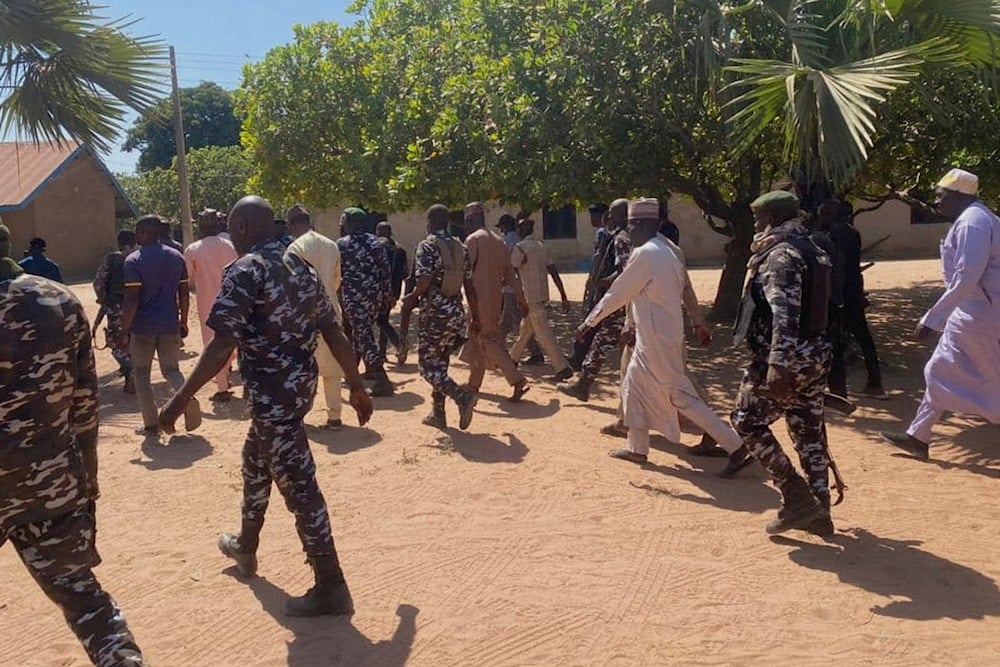Nigeria declares national emergency after mass kidnappings
Nigerian President Bola Tinubu has declared a nationwide security emergency following a surge in mass abductions across Nigeria, including the kidnapping of 265 students and teachers in Niger state.
-

Police and government officials walk past St. Mary's Catholic Primary and Secondary School, where gunmen on Friday abducted children and staff in Papiri community, Nigeria, on November 25, 2025. (AP Photo/Yunusa Umar)
Nigeria’s President Bola Tinubu declared a nationwide security emergency on Wednesday following a wave of mass abductions across the country that saw hundreds of people, most of them children, kidnapped in less than a week. "This is a national emergency, and we are responding by deploying more boots on the ground, especially in security-challenged areas," Tinubu said in a statement.
In a string of coordinated attacks across various regions, armed groups abducted two dozen Muslim schoolgirls, 38 worshipers, more than 300 schoolchildren and teachers from a Catholic boarding school, 13 young women and girls near a farm, and 10 additional women and children.
While some victims were rescued or managed to escape, 265 students and teachers taken from the Catholic school in Niger state remain unaccounted for. The abduction in Niger state marks one of the most significant mass kidnappings since the 2014 Chibok incident, when the Boko Haram group kidnapped 276 girls, sparking international outrage.
In response, President Tinubu announced the immediate expansion of Nigeria’s security forces and authorized additional recruitment into the Armed Forces. "In view of the emerging security situation, I have decided to declare a nationwide security emergency and order additional recruitment into the Armed Forces," Tinubu said.
Tinubu deploys troops and police in emergency response
Over the weekend, Tinubu ordered the redeployment of police officers assigned to VIPs back to core policing duties and approved the hiring of 50,000 new police recruits. According to the European Union Agency for Asylum (EUAA), more than 100,000 of Nigeria’s approximately 371,000 police officers had previously been assigned to VIP protection rather than public safety.
Tinubu emphasized the need for all sectors to contribute to combating the crisis. "The times require all hands on deck," he said, pledging continued efforts to secure the release of all those held in captivity.
Nigeria’s insecurity crisis extends beyond the northeast, where a 16-year-old extremist insurgency persists. Heavily armed criminal gangs have been increasingly active in the northwest and central regions, launching attacks from forested areas in Zamfara, Katsina, Kaduna, Sokoto, Kebbi, and Niger states. These gangs operate from camps in remote forests with little state presence, using them as bases for kidnap-for-ransom operations and other armed violence.
Tinubu authorized the intelligence services to deploy specialized forest guards to track and remove these armed groups. He ordered them to “flush out the terrorists and bandits lurking in our forests,” and called for increased personnel to patrol rural zones.
Between July 2024 and June 2025, 4,722 people were kidnapped across 997 incidents in Nigeria, according to data from SBM Intelligence. The attacks left at least 762 people dead, with criminals demanding a combined 48 billion naira ($33 million) in ransom, of which about 2.57 billion naira ($1.66 million) was actually paid.

 3 Min Read
3 Min Read








